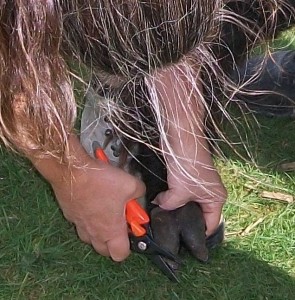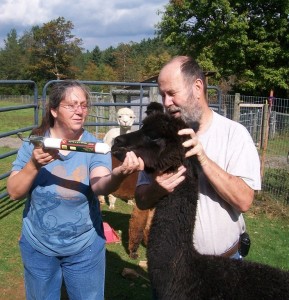Alpaca Health Care
We do “herd health” with our alpacas once a month. This is our time to give everyone an up close check up. We are out with our alpacas at least twice a day, so we usually notice right away if one is not eating properly or has something visibly wrong. Some issues are harder to spot without putting your hands on the alpacas. For example, as the year goes on, their fleece gets thicker and can hide weight loss.
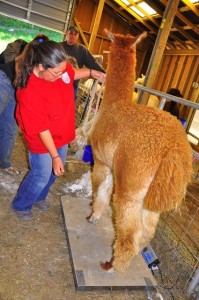 Our herd health sessions are a scheduled time to check everyone’s weight (using one of the most useful alpaca tools we own, our scale), and to check their body score by feeling their midspine region. An extremely prominent spine (an A shape to the back) indicates that an alpaca is too thin. A flat back where you cannot clearly feel the spine indicates that an alpaca is too fat. We are looking for an easily felt spine with a gentle slope to the back. We also check each alpaca over for any visible or hard to see issues.
Our herd health sessions are a scheduled time to check everyone’s weight (using one of the most useful alpaca tools we own, our scale), and to check their body score by feeling their midspine region. An extremely prominent spine (an A shape to the back) indicates that an alpaca is too thin. A flat back where you cannot clearly feel the spine indicates that an alpaca is too fat. We are looking for an easily felt spine with a gentle slope to the back. We also check each alpaca over for any visible or hard to see issues.
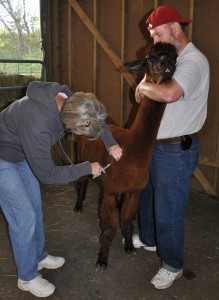 Each alpaca needs a shot every month to protect them from the meningeal worm, a parasite that white tail deer carry and that can cause debilitating and often fatal complications for alpacas. The alpacas really do not seem to mind the shots at all, and will generally stand still for them, some with just someone holding a halter and lead, most with someone holding them gently around the neck.
Each alpaca needs a shot every month to protect them from the meningeal worm, a parasite that white tail deer carry and that can cause debilitating and often fatal complications for alpacas. The alpacas really do not seem to mind the shots at all, and will generally stand still for them, some with just someone holding a halter and lead, most with someone holding them gently around the neck.
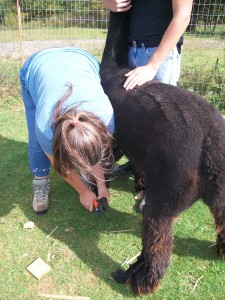 The third task we do is to check their toenails. Alpacas have a soft padded foot with two toes on each foot. Alpaca’s toenails grow continuously, though at different rates. We have found that our lighter alpacas tend to need their nails trimmed monthly, while darker alpacas often can go for several months without a trim. This is the part of herd health that seems to make the alpacas the most nervous. We find that for most alpacas a gentle hold and lifting their feet as little as possible makes them feel more secure.
The third task we do is to check their toenails. Alpacas have a soft padded foot with two toes on each foot. Alpaca’s toenails grow continuously, though at different rates. We have found that our lighter alpacas tend to need their nails trimmed monthly, while darker alpacas often can go for several months without a trim. This is the part of herd health that seems to make the alpacas the most nervous. We find that for most alpacas a gentle hold and lifting their feet as little as possible makes them feel more secure.
We also give the alpacas vitamins each month. We give them A, D, & E which is good for their fleece growth and bone health. It is an apple flavored gel that most the alpacas seem to think tastes pretty good. Though few (besides Sunny) are anxious to open their mouths to take the gel, most smack their lips afterward.
Our monthly herd health time is an important part of caring for our alpacas. It is a great time to make sure that everyone is doing well, even the shy alpacas or those who really prefer not to be touched, and may not get hands on interaction regularly throughout the month.
We feel this time is so important in keeping your alpacas healthy, that we offer training for those who purchase alpacas from us and ongoing support if any questions arise. Learn more about our alpacas for sale here, and then give us a call to set up an appointment to meet them and talk about their care.
